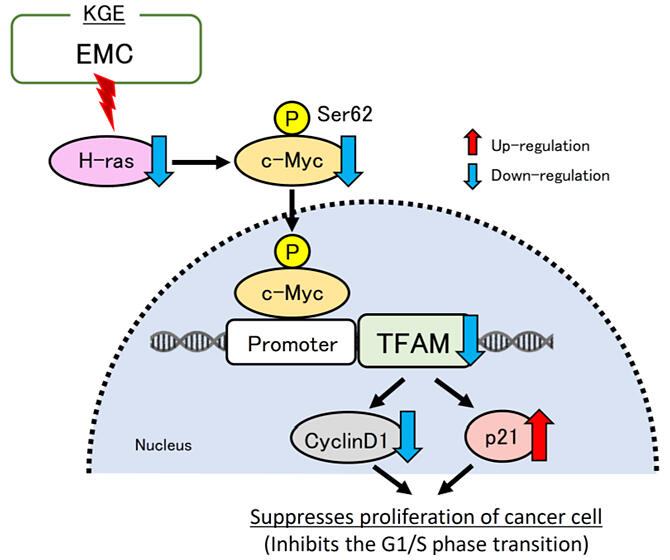A research group led by Graduate Student Yutaro Sasaki and Associate Professor Akiko Kojima of the Graduate School of Human Life Science at Osaka Metropolitan University investigated the anticancer effects of a tropical plant in the ginger family, 'Kencur,' which grows mainly in Southeast Asia and is used as a spice and herbal medicine. Using cell and animal experiments, the research group demonstrated that the Kencur extract, and its main active component significantly inhibited the proliferation of cancer cells at both the cellular and animal levels. The study results were published on June 22, 2023, in the scientific journal Heliyon.

EMC decreases the expression level of H-ras and suppresses the phosphorylation of c-Myc at Ser62. As a result, the transcriptional activity of c-Myc is reduced, and the expression level of TFAM, the target gene of c-Myc, is decreased. Decreased expression of TFAM induces cyclin D1 downregulation and p21 upregulation, inhibiting EATC proliferation by blocking the S-phase progression.
The association between dietary habits and cancer prevention has been reported, and the anticancer effects of plant-based foods have been gaining attention in recent years. Kencur is known to have physiological effects, including anti-inflammatory and antioxidative effects. However, its anticancer effects had not been uncovered.
In this study, the anticancer effects of Kencur were investigated in cell experiments, using mouse-derived Ehrlich ascites tumor cells (EATCs), and in animal experiments, using cancer-bearing mice generated through the intraperitoneal administration of EATCs. The Kencur extract and its main active component, ethyl p-methoxycinnamate (EMC), significantly inhibited the proliferation of EATCs at both the cellular and animal levels.
Moreover, the mechanistic study revealed that EMC is involved in the downregulation of TFAM gene expression (mitochondrial transcription factor A).
Although the TFAM gene had been identified through genetic engineering to play an important role in cancer cell proliferation, its role in promoting the anticancer effects of food components had not been unraveled. In this aspect, the current study achieved landmark findings. This study also demonstrated that decreased expression of the TFAM gene inhibits cell cycle transition from the DNA synthesis preparation period (G1 phase) to the DNA synthesis period (S phase) by regulating the expression of cell cycle regulators (cyclin D1 and p21), not by inducing mitochondrial dysfunction.
These findings confirmed the anticancer effects of the Kencur extract and its main active component, EMC. Further research in related fields is expected to identify the TFAM gene as a novel marker for anticancer effects.
Kojima stated, "The undiscovered power of food components has been attracting me for a long time to engage in research into their effects on lifestyle disease prevention and their mechanisms. Finding answers to questions is the best but also the hard part of research. I would like to keep contributing to people's health and longevity through the field of food."
Journal Information
Publication: Heliyon
Title: Kaempferia galanga L. extract and its main component, ethyl p-methoxycinnamate, inhibit the proliferation of Ehrlich ascites tumor cells by suppressing TFAM expression
DOI: 10.1016/j.heliyon.2023.e17588
This article has been translated by JST with permission from The Science News Ltd. (https://sci-news.co.jp/). Unauthorized reproduction of the article and photographs is prohibited.




